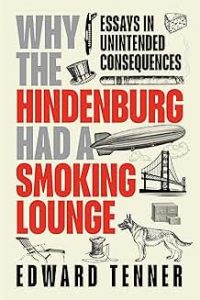It’s taken me a long time to read Edward Tenner’s Why the Hindernburg Had A Smoking Lounge. It’s a collection of enertaining and interesting essays, largely about unintended consequences (for example, as a result of the marketing decision to include a smoking lounge to attract well-heeled passengers on said airship) or technology or both. However, it is a heavy tome and I could only read it in one place propped on cushions. So a good read but perhaps one to leave at home and dip into an essay at a time.
There are loads of aha! moments in the book. One of my favourite essays is ‘The Importance of being Unimportant’, arguing that the highest profit margins come from essential components that are a small proportion of the total cost of the finished product – bicycle valves for instance. This introduced me to the work of Edwin Mansfield, who estimated that stronger sewing thread had “contributed more to productivity and well-being than any other innovation, including information technology.” (And who knew that Kenneth Clark of Civilization fame was so rich because the former inherited money from the IPO of the Coats thread-making business.)
I also enjoyed, as another example, the essay ‘Engineers and Political Power’, which pointed out that the US Congress has almost no engineers as members – lawyers, rather – whereas non-Anglo-Saxon cultures often have many engineers as legislators. The point the essay makes isn’t just about legislation being made mainly by lawyers, though, but about engineers being uniquely “apolitical” in the Anglo-Saxon world.
If, like me, you’re a fan of new facts and surprising insights, this is the book for you. But not a beach read, given its heft, unless in an electronic version (or unless you want to tone your biceps on holiday).

